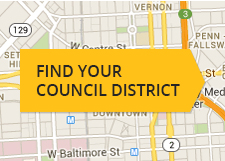Council President Scott Calls for Hearing to Address Neighborhood Disparities in Delivery of City Services
Council President Scott Calls for Hearing to Address Neighborhood Disparities in Delivery of City Services
Council President to Introduce “Informational Hearing: 311 and Disparities in Response Time”
BALTIMORE, MD (December 16, 2019) — At Monday's City Council meeting, Council President Brandon M. Scott will introduce a resolution calling for an informational hearing on “311 and Disparities in Response Time” (19-0186R). The bill requests that representatives from 311 and the Department of Public Works come before the City Council to explain why there are such large disparities in service response time on the basis of where someone lives.
“Baltimore has an equity problem,” said Council President Scott. “Residents who request help with things like illegal dumping and broken streetlights shouldn't be treated differently based on where they live. We absolutely cannot use zip codes or income to determine which residents are most worthy of city services. Our residents deserve better.”
Data from Open Baltimore shows that between January and October 2019, requests for service were routinely completed after the expected resolution date – with the exception of requests from Southeast Baltimore, where requests were largely addressed on time. Southeast Baltimore is notably wealthier than other parts of the city with a higher proportion of white residents.
“These data clearly show that an inequitable city government is an ineffective one. I will continue to hold city government accountable to all residents in every neighborhoods across the city. Baltimore must embed a framework of equity into the way we do business as a city,” continued Council President Scott.
The hearing will address why these response disparities exist and what can be done to resolve all complaints within the recommended time frame of one week.
Baltimore City residents can use the 311 system to report code violations, request city services, and receive information on matters like erroneous water bills, illegal dumping, illegally parked cars, and graffiti removal. The recommended deadline for removal of trash from an alley, for example, is 7 days. However, this standard is not regularly met and can vary drastically according to where you live.
In 1996, Baltimore was the first city to implement a non-emergency request center, known as 311.
Council President Scott introduced and passed important legislation that requires City agencies to conduct an equity analysis and to participate in equity training. The Equity Assessment Program is in the early stages of implementation and is an step toward redressing inequitable policies and practices in Baltimore. These requirements will move government agencies, including DPW and 311, to rethink the way they formulate policies and deliver services.
View the bill as drafted here.
CONTACT
Candance Greene
Deputy Director of Communications
Office of City Council President Nick J. Mosby
443-602-5346
candance.greene@baltimorecity.gov

